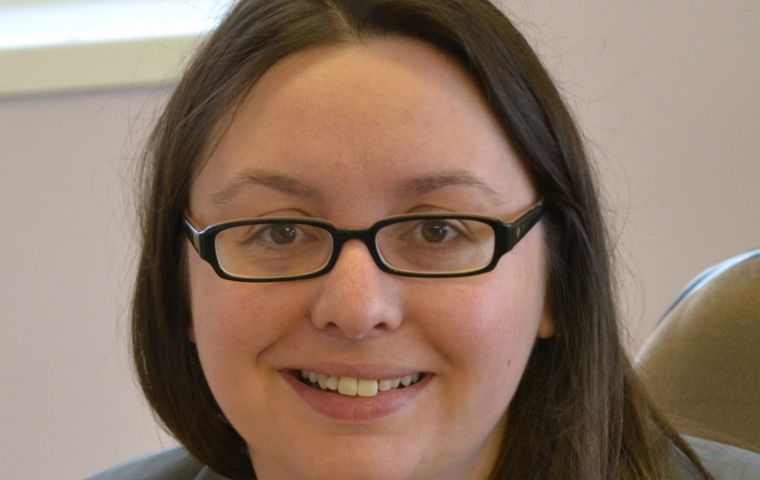MercoPress. South Atlantic News Agency
Falklands ‘confident’ about ‘mutually acceptable outcome’ on taxes with oil company
 Financial Secretary Nicola Granger working with an international specialist valuation advisor
Financial Secretary Nicola Granger working with an international specialist valuation advisor  Stephen Luxton, Director of Mineral Resources: fully aware of the need for investors to be comfortable
Stephen Luxton, Director of Mineral Resources: fully aware of the need for investors to be comfortable The Falkland Islands Government remains, “confident that a mutually acceptable outcome can be reached with Rockhopper,” on the matter of their tax bill from FIG, confirmed Financial Secretary Nicola Granger last week and indicated the situation would have no impact on local tax laws.
The oil exploration company reported in August a full-year loss of 75 million dollars (£48 million) due to a 122 million dollars tax bill from the Falkland Islands government.
FIG followed this up with an announcement at the time that in accordance with usual practice they were reviewing the tax return submitted by Rockhopper on May 17. They added however, that given the, “extraordinary circumstances surrounding Rockhopper's application to the High Court to cancel its share premium account, an initial tax assessment was raised by the Falkland Islands Government Tax Office on June 11 prior to agreement of the tax liability.”
FIG announced they were working with an international specialist valuation advisor in order to achieve, “a mutually acceptable outcome.”
Contacted by Penguin News FIG Chief Executive Keith Padgett and Mrs Granger indicated it would not be appropriate for Government to make any comment on the tax affairs of any individual or company.
Asked whether the final deal would be made public and also, would it represent a change which requires amending tax law, Mrs Granger explained that even after the fact FIG could not disclose details about specific tax payers, but that government would, “continue to publish financial monitoring reports through Standing Finance Committee which would include any amounts paid.”
She added: “The assessment is being undertaken under current Falkland's tax law and FIG have no intention of changing the fiscal regime relating to the oil and gas industry.”
Earlier in the week a long piece from Bloomberg, credited to Brian Swint said that “the unexpected level of capital gains tax demanded -- four times what Rockhopper estimated -- risks scaring funds away from further prospects in the Falklands, which has struggled for investment”.
“You don’t want to be overly aggressive toward your first project before it’s even been given an investment decision,” said Ivor Pether, a fund manager who helps oversee about 15 billion dollars at Royal London Asset Management, which has added to its Rockhopper holdings this year. “It’s counterproductive to the interest of developing a viable oil industry.”
“The Falkland Islands Government is fully aware of the need for investors to be comfortable that there is a stable and transparent fiscal regime in order to make an informed investment decision,” Stephen Luxton, Director of Mineral Resources for the Falkland Islands government, said in an e-mail.
For that reason, the government “has always been absolutely clear that there are no plans to alter the fiscal regime -- which has remained unchanged since inception in the mid-1990s.” The government “believes its current fiscal regime is entirely appropriate to the needs of a remote frontier exploration area.”
“It’s a mistake for governments that suddenly have a big discovery to try to milk the cow before it’s even born,” Ali Moshiri, president of Chevron Africa and Latin America exploration and production, said at the Oil & Money conference in London on Oct. 1, not specifically speaking about the Falklands.
“If you change the rules, the next investor is going to think twice” said Ali Moshiri who recently signed a 1.2bn dollars investment agreement with YPF to help develop shale deposits in Patagonia.
Rockhopper plunged 13% on Aug. 22, the day the tax charge was made public, and has since recovered about 8 percent. The company said Sept. 26 that it has agreed on a “valuation methodology” with the Falkland government and that the two sides are discussing how to value Premier’s commitment to pay past drilling and future development costs.
“We wouldn’t comment on the tax affairs of any one company, but we’re confident that people will reach a successful conclusion,” Luxton of the Falklands government said. “Part of the funding will go to providing the readiness we need.”
The offshore Sea Lion oil discovery may generate government revenue of about 160,000 dollars per person each year when it starts production, according to Edison Investment Research. That’s equivalent to the after-tax income of a top 1 percent earner in Britain, figures from the Institute of Fiscal Studies show.
Odey Asset Management, a London-based fund that holds 13% of Rockhopper, asked the company earlier this year to return 130 million dollars or about half the cash from the farm-out, to shareholders. Rockhopper made the legal arrangements to free up funds for distribution but says it doesn’t plan a payout until it has a better idea of how much cash it will need for costs and taxes.
Premier and Rockhopper this year raised their estimate for recoverable oil at Sea Lion by about 15% to as much as 402 million barrels. At the same time, the date for first production has been pushed back to 2018, compared with an estimate of early 2016 before the farm-out.
The main cause of the setback is a debate over whether to build a floating storage and production facility or a platform in the South Atlantic Ocean that will be capable of drilling new wells to bolster output. They expect to make a final investment decision by the end of next year.
“The important thing is that all the technical work on the geology has yielded an increase of the estimate,” said RLAM’s Pether. “There’s a delay because of an engineering debate, but we may end up with a lower-cost project that has higher output.”




Top Comments
Disclaimer & comment rules-

-

-

Read all commentsI'm sure a mutually acceptable agreement can be reached.
Oct 06th, 2013 - 10:05 am 0Hey Argentina look at this. A very small community know how to play the diplomatic game much better than the bunch of clowns you have running your country.
Magic, this'll fit right in to my plans.
Oct 06th, 2013 - 10:10 am 0As son as I finish up here in Nigeria, - It's the Falklands for me......
'Everyone's a winner baby thats the truth'
The FALKLAND ISLAND GOVERNMENT are not going to shoot the “ Goose that lays the golden egg ” rest assured on that.
Oct 06th, 2013 - 06:54 pm 0Commenting for this story is now closed.
If you have a Facebook account, become a fan and comment on our Facebook Page!